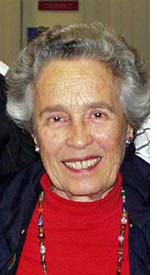By Eileen Wingard

SAN DIEGO–The greatest violinist of the 20th century is brought to life in an excellent documentary, G-d’s Fiddler: Jascha Heifetz by Peter Rosen. Heifetz’s biography is outlined through photos, video clips, testimonials by famous violinists Itzhak Perlman, Ivry Gitlis and Ida Haendel, former students Andre Granat, Sherry Kloss and Ayke Agus and two cellists, Nicholas Rosen and Jeffrey Solow, both students of Heifetz’s friend and colleague, the renown cellist, Gregor Piatigorsky.
Throughout the documentary, we hear and see Heifetz’s remarkable playing, performances at the pinnacle of perfection, whether for paid audiences at Carnegie Hall or for a group of GI’s on foreign soil. Heifetz’s uncanny technical control and expressive beauty stay constant throughout his 70- year career, honed through the merging of innate talent, outstanding instruction and strong-willed discipline.
The genius’ humanity and lighter side is shown as we see the jovial host at holiday parties, the patriot playing USO shows in dangerous war zones, or hear tales about his generosity to his students. He even wrote a pop love song under the name Joe Hoyl. It made the Hit Parade.
The presentation of the Heifetz documentary is not the first time Jascha Heifetz has been the focus of programming at the Lawrence Family JCC. In March, 2003, as part of the 4th Annual Celebrating Jewish Music, his student, Zina Schiff, presented a recital, Homage to Jascha Heifetz. For three weeks, the Jascha Heifetz Exhibit, now housed at the Colburn School, was on display in the Viterbi Family Galleria. A panel discussion: Who was Jascha Heifetz featured Zina Schiff, Eric Bromberger and Geoffrey Brooks, and there was a movie screening of They Shall Have Music, featuring the great violinist. Not only did these events attract large adult audiences, but a number of schools sent students to see the exhibit and attend the recital.
I wish more had been said in the documentary about Heifetz’s connection with Israel. Although it mentions recitals in Palestine, his leaving his earnings to help found the first concert hall in Tel Aviv, called the Heifetz Hall, is not mentioned. Nor is there any reference to the unfortunate incident outside the King David Hotel in Jerusalem when he was assaulted and suffered an injured wrist after he played the Richard Strauss Sonata. Neither was anything said about the fact that, during the War of Attrition, when the Israel Philharmonic toured the US, he offered to be the soloist at the Hollywood Bowl so that it would fill to capacity and help raise needed money for Israel.
The Heifetz documentary is a must see for all violin students, all classical music lovers, and anyone who wants to listen to this mortal with God-given talent, the greatest violinist of the 20th century, Jascha Heifetz. It is scheduled for screening during the San Diego Jewish Film Festival three times: at 3 p.m. Feb. 15 and 1 p.m. Feb. 19 at the Clairemont Reading 14, and at 7:15 p.m., Feb. 18, at Edwards San Marcos.
*
Wingard is a retired violinist of the San Diego Symphony Orchestra and a freelance writer. She may be contacted at eileen.wingard@sdjewishworld.com